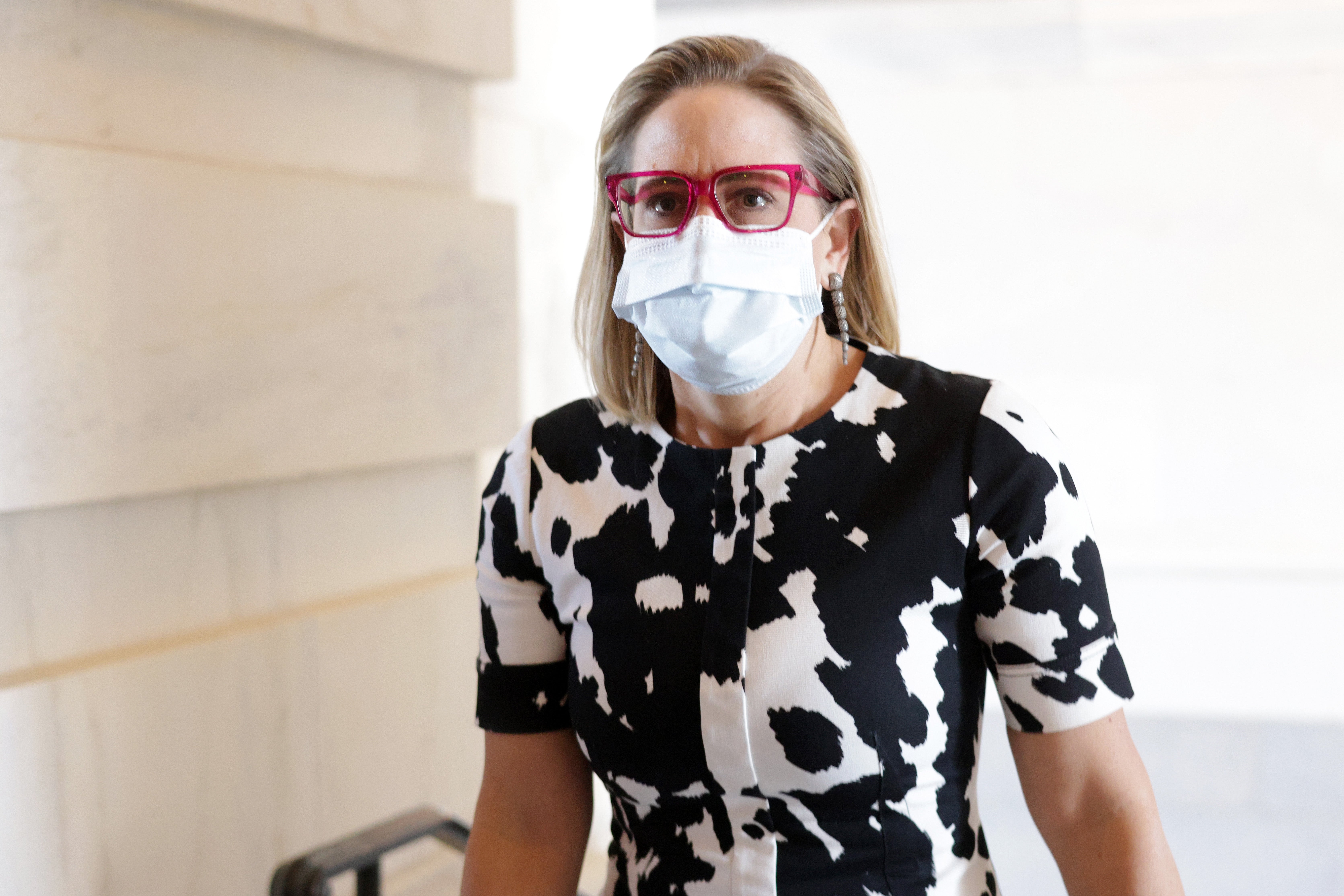Protesters following Kyrsten Sinema into the bathroom undermined their efforts
Where does a public restroom fall in the realm of public spaces? We’re all entitled to a certain level of privacy in such situations


You’d be hard pressed to find a Democrat or left-leaning person in the United States who isn’t currently tearing their hair out with frustration about Kyrsten Sinema – including, it seems, President Joe Biden himself.
Once asked by reporters what she would say to her progressive colleagues who simply want to know where she stands, Sinema glibly replied that she was “in front of the elevators”. Pressed with the conundrum of how to get through to Sinema, who has seemed so-far unwilling even to engage with her colleagues or constituents, a group of youth organisers confronted the Arizona senator outside her classroom at the University of Arizona.
In a video posted to Twitter by the group Living United for Change in Arizona (LUCHA), a small group of organisers are shown pressing Sinema on why she won’t support Biden’s Build Back Better plan, following her into the bathroom and continuing to speak through the closed stall door. One of the speakers identifies herself as Blanca, an undocumented youth with no current path to citizenship. “We need to hold you accountable to what you promised us that you were going to pass when we knocked on doors for you,” Blanca states over the sounds of toilets flushing.
The unconventional form of activism sparked a debate online, between those who applauded the young people’s tenacity in holding Sinema accountable for her votes, and those who felt that following her into the bathroom – where she had a reasonable expectation of privacy – was a step too far. In a statement to The Daily Beast, Sinema’s communications director merely said, “We are not dignifying this behavior with a response.” LUCHA followed up the original video with a second tweet, saying, “We wouldn’t have to resort to confronting [Senator Sinema] around Phx if she took meetings with the communities that elected her. She’s been completely inaccessible.”
It is inarguably true that Sinema has stonewalled every attempt to communicate with her, and she doesn’t get to simply hide away and evade responsibility from the people who elected her. If she’s in a public space, she should be prepared to get called out.
But where does a public restroom fall in the realm of public spaces? In a year when right-wing activism has included bringing actual weaponry into the halls of government, and women lawmakers (such as Michigan Governor Gretchen Whitmer) have been specifically targeted and threatened, we need to talk about boundaries. At the very least, couldn’t organisers have waited for Sinema outside the bathroom doors? And what of the privacy of the other people using the bathroom at that time?
Progressive legal analyst and journalist Elie Mystal tweeted in response to the video, “There is absolutely no upside to protesting people while they’re in the bathroom.” In purely practical terms, Mystal argues that as a result, the activists’ message was lost in the debate over whether or not the bathroom protest was appropriate. “She looks *terrible* running into the bathroom to get away... until you follow her into the bathroom. Promise you it would have been more effective if he just waited for her to get out. Like, she wasn’t going to LIVE in there. She was coming out eventually.”
But organiser Melissa Byrne countered, “Folks. There is a place for movement critique but it’s not on Twitter as young advocates have the right wing calling ICE on them.” Activist and writer Kenyon Farrow agreed, quote-tweeting Mystal, “I’ve done a lot of actions involving public officials and the amount of finger wagging at activists re: tactical, often split-second decisions to hold electeds accountable to stop our slide even further into fascism is really disappointing to witness of late.” More to the point, as podcaster Cody Johnston wrote, “If it becomes clear that the only way to influence a congressperson is by giving them money, then people without money are going to bother them in the bathroom. That’s the deal.” But I’m not sure that is the deal actually.
The arguments on both sides fall along familiar “civility politics” lines. Did the protesters who spent days paddling up to Senator Joe Manchin’s houseboat and shouting directly at him at his home also cross a line? What about the people who heckled Mike Pence out of his favourite restaurant? But there is a big difference between hassling a politician at a restaurant, or even outside their home, and hassling a politician as they, and various others, wipe their bums.
The question is not about whether or not Sinema’s constituents have a right to make her uncomfortable for as long as she fails to uphold her promises to them – which they do – the question is whether doing so violates a space that must be kept safe for everyone. The protesters who followed Sinema into the bathroom clearly were not violent and posed no threat to anyone else who was there. But let’s be honest, that is not a given. Sinema had a right to expect a certain degree of privacy in the bathroom, and to have that boundary violated could understandably be viewed as threatening. It could also be viewed as threatening to the other people in the bathroom simply doing their business, people who are not public figures or politicians and certainly never agreed to be filmed while in the toilet.
The bathroom is the closest thing to a private space that exists in a public building – and such private space is necessary for everyone, not just Sinema. We all need a place to pee, to change a tampon, to cry, to take our medications, to panic, to vomit – unmolested. It is one of those places where we, in general, agree as a society to respect one another’s personal space. This is not about respectability politics and it’s not about haranguing young activists for a single misstep. The bathroom is a line everyone agreed to respect long ago. Let’s keep it that way.

Join our commenting forum
Join thought-provoking conversations, follow other Independent readers and see their replies